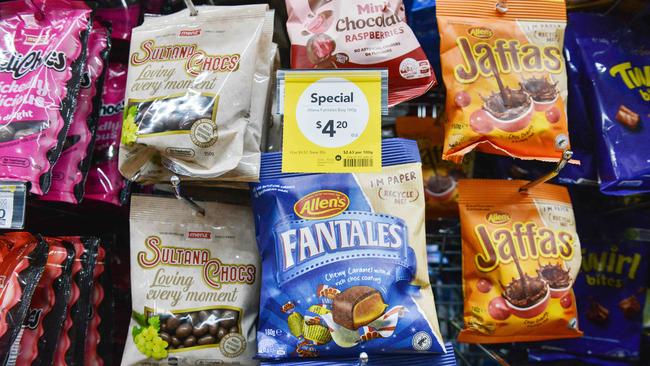Balanced regulations needed in tough times
Calls for sugar taxes, ad bans on certain foods and gambling, and plain packaging in the lolly aisles would each be damaging but collectively could be devastating for small and large businesses.

What an incredible ray of sunshine the Paris Olympics was against the backdrop of some of the most tumultuous economic and geopolitical events of our time.
Our Aussie champions have brought home our best medal tally ever to the adulation of bleary and teary-eyed Australians.
To be No.4 in the world in the medal tally is simply an astonishing achievement for a relatively small population like ours.
As we collectively come back to reality from this incredible high, we are faced with a dazzling array of what seem to be insurmountable challenges here and abroad.
Global markets are in turmoil and there are hints of a global recession. The political circus in the US continues, and our own Australian federal election is just around the corner.
Wars are raging as many, including some of her allies, take advantage of the ongoing distractions in the US, with the very real threat of a significant escalation in the Middle East.
All this chaos and uncertainty is causing havoc to supply chains, with ships forced to avoid the Suez Canal (and Houthis) and go around the Cape of Good Hope, adding weeks and huge costs to global shipping.
As the Reserve Bank pointed out in its most recent monetary policy decision, growth has slowed, unemployment is on the rise, businesses are under pressure, and the outlook is weak, if not bleak.
For any government, this should be the time to do whatever it can to help stimulate the economy and help businesses – as the engine room of the economy – ride the storm.
It should be the time of regulatory moderation, not regulatory overreach, in areas that could have a negative impact on jobs and the economy.
Bizarrely, a number of policy issues have crept from what used to be the periphery of acceptable regulatory intervention to the forefront of the minds of some governments around the nation.
There is an increasing drum beat of minor parties, parliamentary committees and departmental inquiries calling for extreme regulatory intervention in areas that traditionally fell squarely within the sphere of personal or parental responsibility.
We are seeing calls for sugar taxes, advertising bans for unhealthy food and gambling, plain packaging in confectionary aisles, and changes to privacy laws that will cripple the ability for businesses to advertise (and grow) responsibly.
On their own, each of these policies would have a significant impact. Taken together, they could be devastating for many small and large businesses – just when they are struggling to find their feet.
For some of these policy proposals – like gambling advertising – there is a clear concern within the community, and it is broadly accepted that change needs to happen.
And for some of the other proposals, there is a clearly identified benefit to the public.
The core question should not be whether there is some benefit to the community – that should be a fundamental starting point for any regulatory intervention.
In these challenging times, the key question for every government should be: Is it a proportionate and effective response to the policy issue, balanced against the likely impact it will have on the economy?
Let’s take the proposal to ban unhealthy or junk food advertising as an example.
This is often put forward as the solution to obesity in Australia.
Australia has some of the strictest rules around food and beverage advertising in the world, with high levels of compliance. These rules effectively ban advertising of unhealthy food to children and are designed to encourage the promotion of healthy eating.
The industry is also taking action to support the government’s preventive health initiatives through reformulation of products to reduce sodium, fat and sugar.
It is also not a priority for the public, with recent research conducted by Ad Standards finding that food and beverage advertising, including junk food, is among the least concerning, with just 17 per cent of consumers expressing concern for this category. It also accounts for a mere 1.62 per cent of all complaints to Ad Standards.
Similar advertising bans have failed to reduce obesity rates in the countries and provinces into which they were introduced, such as the United Kingdom, Chile and Quebec. In fact, obesity rates have increased after the bans were brought in.
Conversely, the potential impact of an ad ban across multiple industries would be significant and far-reaching. The $141.5bn food and beverage industry would contract and there would be substantial flow-on effects to suppliers, farmers and transport. This would cause job losses and some businesses to close.
The media industry would also see hundreds of millions of dollars torn out of advertising revenue, further adding to their current woes. This would affect all our access to free journalism and sport.
Do we really want to pay to watch the 2028 Olympics in Los Angeles?
There is also a real question about whether community sport would survive in Australia without sponsorship.
Of course, the government and industry have an important role to play in building better health outcomes and protecting the public, particularly children, from harmful products.
But we can’t lose sight of the need to take a balanced and proportionate response to these issues, based on hard evidence, that considers the broader impact on jobs and the economy.
Josh Faulks is the CEO of the Australian Association of National Advertisers



To join the conversation, please log in. Don't have an account? Register
Join the conversation, you are commenting as Logout